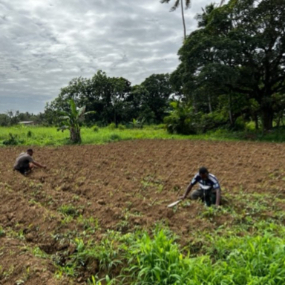The Church of Jesus Christ of Latter-day Saints and Adventist Development and Relief Agency (ADRA) are collaborating to improve nutrition and increase self-reliance in five Fiji villages. Seeds and farming implements were recently provided in conjunction with much needed training.

ADRA-Project-Fiji
White, red and yellow cassava varieties are planted in this demonstration field.© 2022 by Intellectual Reserve, Inc. All rights reserved.Officers from the Ministry of Agriculture were brought in to teach classes and necessary skills to villagers, such as choosing crops wisely, understanding organic methods, knowing when to plant crops and how to care for the crops. Land belonging to the villages were planted as “demonstration fields” to give hands on training to the people. The fields are allowing them to learn to produce a variety of vegetables, thus expanding the village diet and nutrition.
The fields also allow space for experimenting with different varieties of cassava plants. Normally, a farmer would use their own limited space to plant just one type of cassava. With the variety, a year-round harvest would be more likely.
The village women were taught other important new skills to benefit their communities. The ability to dry their own cassava harvest and grind it into flour lets them bake and cook a wider variety of meals. Cassava flour has important advantages over wheat flour as it is not prone to insects, is gluten free and no longer needs to be purchased.
Other hands-on classes showed the women more efficient and healthier methods for making chutney and jam using cassava. The women are thrilled to have these improvements and plan to teach them to neighboring villages.
Aseri Bui and Amele Mocevakaca explain their new skills in this video:
The second phase of the project was for villagers to take what they learned into their own small gardens at home. With donated packets of seeds, tools and their newfound knowledge, families are raising a variety of vegetables in their own yards. Some of the techniques they learned help them adapt their gardens to their individual circumstances and available resources, such as using bamboo to build raised gardens.
| Temple Square is always beautiful in the springtime. Gardeners work to prepare the ground for General Conference. © 2012 Intellectual Reserve, Inc. All rights reserved. | 1 / 2 |
Villagers noted what a difference this has made for their families already. Their limited diets have expanded with the addition of vegetables such as tomatoes, eggplants, cucumbers, capsicums, green beans and other nutritious options. Producing more foods also creates self reliance and peace of mind.
The village farmers were happy to show visitors their garden plots and cassava products with a keen sense of accomplishment. Over time, families will become proficient enough to start small businesses selling the produce and cassava flour they don’t use themselves. It is estimated that the project will impact over 250 village families.